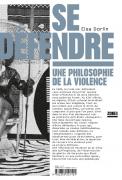Even today, despite the teachings of history, some lives matter so little that you can shoot a teenager in the back by claiming that he was aggressive, armed and threatening. A historical dividing line opposes the bodies "worthy to be defended" by those who, disarmed or rendered indefensible, remain exposed to the violence of the ruling power.
This organized "disarmament" of subordinates and the oppressed for the benefit of a minority with the permanent right of possession and unpunished use of weapons directly raises the question of the use of violence to defend every liberation movement.
From the ju-jitsu suffragettes to the insurgent practices of the Warsaw ghetto and the Black Panthers, passing through the queer brigades and contemporary resistance movements, Elsa Dorlin, a philosopher with bare hands, traces a history of self-defense in this work.
An itinerary that does not draw on the most explanatory examples but seeks a memory of the struggles in which the bodies of the dominated constitute the main archive, working on a real martial genealogy of the self.
